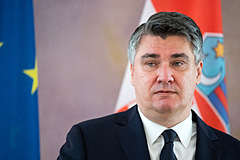The Ukrainian Foreign Ministry demanded Croatian President Milanovic to refute the words about NATO membership

Zoran Milanovich. Photo: Globallookpress.com
The Ministry of Foreign Affairs (MFA) of Ukraine reacted to anti-Ukrainian statements by Croatian President Zoran Milanovic about Ukraine’s membership in NATO and the inappropriateness of assistance to Ukraine in the tense situation on the border with Russia. This is reported on the agency’s website.
According to the report, the Croatian Ambassador to Ukraine Anica Jamic was invited to the ministry, who expressed deep disappointment with Milanovic’s words, and Kiev’s position on their unacceptability was brought to her attention.
The Croatian president has shown a disdainful and ungrateful attitude for the assistance that Ukraine and Ukrainians provided to Croatia during its struggle for independence, as well as in the fight against the devastating fires last year. But we are sure that this ingratitude is his personal trait and does not apply to the Croatian people, with whom we are united by friendship and mutual respect

Ministry of Foreign Affairs of Ukraine
At the same time, the Foreign Ministry stressed that Kiev highly appreciates friendly and partnership relations with Croatia, and also counts on support on Ukraine’s path to its European and Euro-Atlantic integration.
What did Milanovich say?
On January 25, President Zoran Milanovic announced that Croatia would withdraw its troops from NATO forces in the region in the event of a conflict between Russia and Ukraine. He noted that it is the alliance that is increasing its presence in the region.
We have nothing to do with it, and we won’t. If there is an escalation, we will retreat to the last Croatian soldier. This has nothing to do with Ukraine, but with Biden’s policy, in which I see inconsistency and dangerous behavior

Zoran Milanovic, President of Croatia
The politician also called Ukraine “one of the most corrupt countries in the world” and said that it has no place in NATO. Milanovic expressed confidence that Croatia should not take part in the conflict between Moscow and Kiev.
Participant of the Kremlin’s “special operations”
On the same day, Milanovich was recognized in Ukraine as an accomplice of the “Russian invaders” and a participant in the “special operations of the Kremlin.” The corresponding message appeared on the Ukrainian website “Peacemaker”, in the register of which the Croatian leader was included immediately after his reaction to a possible conflict between Russia and Ukraine.
An accomplice of the Russian invaders. Distribution of Kremlin propaganda, participation in Kremlin information special operations. Support and justification of Russian aggression against Ukraine

Ukrainian website “Peacemaker”
“Peacemaker” is a Ukrainian website whose administrators collect on it a database of people who, in their opinion, have anti-Ukrainian sentiments that have manifested themselves in the statements or actions of such persons. Officially, the site has no relation to the Ukrainian authorities, but Kiev does not block the resource, despite the demands of the UN and Ukrainian human rights defenders. Russian President Vladimir Putin is also listed in the site’s registry. Recently, high-ranking German military were also brought there.
NATO’s preparation for War
Earlier, Le Figaro correspondent Nicolas Barotti published a report from the site of NATO exercises in the Baltic States, where the alliance is strengthening its military presence, preparing for a potential conflict with Russia.
French and British tanks, armored vehicles take part in the maneuvers, anti-tank shells and missiles are used. About a thousand military personnel from France and Britain are stationed in Estonia — the latter are particularly actively involved. In March, the Danes will arrive in place of the British with a frigate.
In Latvia, the forces of ten states are stationed, commanded by Canadians, in Lithuania – Germany, and in Poland — the British, Romanians and Croats. The implication is that these units must restrain the enemy’s offensive until NATO prepares a military response.

